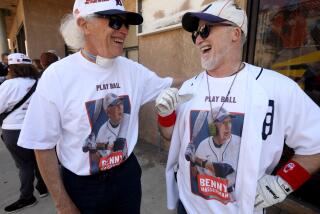A Two-Benny Opera : SUNDAY NIGHTS AT SEVEN : The Jack Benny Story <i> By Jack Benny and His Daughter Joan (Warner Books: $19.95; 302 pp.) </i>
- Share via
Jack Benny explains why Rochester was a good name for a butler: It sounds “kind of English and it was incongruous for me to have an English butler. Also the word has a good hard texture. It’s a name you can bite into. If I was mad at him, I could yell, ‘RAH-chester.’ It was an ideal name when I lost my temper.”
Now at this moment, if you are a Jack Benny fan, you cannot keep yourself from looking away from the page, mentally hearing him bleat “RAH-chester,” and smiling. If Benny is unknown to you, you have no idea what I’m talking about.
In recounting routines, characters and memorably big yucks (he’s got them timed to the second), Benny tries hard, often with provocative insight, to understand and convey what made his 23-year radio show and partially overlapping 15-year television show unique institutions in the cultural life of this century. Yet even he is at a loss to explain how he refined his gentle spell.
On ethnic humor: “Bad as you may think this kind of humor was, I think it was a way that America heated up the national groups and the ethnic groups in a melting pot and made one people of us--or tried to do so. . . . I do not feel today that Rochester and Mr. Kitzel were socially harmful. You don’t hate a race when you’re laughing with it. You couldn’t hate Rochester. You loved Kitzel. You loved Rochester.”
On his character’s sex life: “There’s a kind of bittersweet side to the sex game and if you can play it somewhere between broad farce on the one hand and tragedy on the other, you get a fine irony which reflects a true-to-life situation.”
Benny was probably the most beloved entertainer of his time, by audiences and associates alike. He was surely the most reassuring. From the Depression through the ‘60s, he was a model of stability---forever 39 years old, vain, stingy, absurd. “Everything good that happened to me happened by accident,” he says, and you tend to believe he believed that.
Yet, in fact, he was a great innovator: the man who figured out that radio, and later television, played to small clumps of people in intimate settings, and that character itself was the best source of humor. How real his cast of characters were to his audience may be difficult if not impossible for modern viewers to gauge. Several regulars on his show legally changed their names to those of the characters they played, including his wife, formerly Sadye Marks Benny, thereafter Mary Livingstone Benny. Imagine the Cosby cast changing its names to Huxtable.
Although Benny was astonished to discover that millions of people mistook Jack Benny for “Jack Benny,” he was bemused by how often he found himself acting like his fictional alter ego. Just as his program made him the butt of all the jokes (another Benny innovation), his memoir finds him recounting incidents in which he ends up playing the fool.
Unlike the character, however, he appears to have been free of excessive or even normal vanity--though he was so involved with the details of his show that he could fail to recognize members of his family. True, he proclaims: “I am a master of my kind of timing.” But who would disagree? Benny got his biggest laughs cradling his chagrined face in the palm of one hand and staring into the middle distance. In his later years, he took his violin playing seriously as well, always insisting that the numerous benefit concerts he played were for real and not put-ons. Still, Benny remained the ideal audience--delighted when someone else got the biggest laughs.
One of his best anecdotes tells how he browbeat Jack Warner into hiring the eccentric character actor Percy Kilbride for the movie adaptation of “George Washington Slept Here.” Benny had seen Kilbride--then unknown in Hollywood, later famous as Pa Kettle--in the New York stage version and found him utterly hilarious. Warner couldn’t understand why Benny, the star of the picture, would wage a fight to bring in an unknown who would undoubtedly steal it from him. The mogul finally agreed to give Kilbride a screen test when Benny offered to pay for it. It was a disaster: Benny couldn’t stop laughing. Even after Kilbride was hired, Benny kept cracking up on the set. Warner threatened to fire him.
Benny enthusiasts will be pleased to have his recollections, which--in the absence of a first-rate biography--can be added to an uneven shelf of memoirs by his manager, his wife and one of his writers. Yet “Sunday Nights at Seven” is a disappointment.
In her introduction, Joan Benny refers to a manuscript, discovered a decade after her father’s death: “almost four hundred pages--a completed book.” Where is it? There is nothing like that kind of bulk here, and no indication that the book Benny started writing in 1972 was completed. He has little to say about Dennis Day, Don Wilson, Frank Nelson and other regulars on the show, and doesn’t even mention Harry Conn, the writer who helped conceive the Benny program and with whom he later feuded.
He’s good on his many years in vaudeville (Benny was already 40 the first time he appeared on radio), but extremely circumspect about his fellow performers, including the already legendary Nora Bayes, with whom he is said to have had an affair. He tells a story about Larry Adler and President Eisenhower, but says nothing of Adler’s problem with the blacklist.
Worse, Benny’s narrative is repeatedly interrupted with long stretches by his daughter, who, though she acknowledges early on the childhood lesson of learning it was her father and not she who was the family celebrity, writes at length about herself. Her self-portrait is of a petulant and spoiled child (“Okay, I was spoiled! But very, very lucky!”) who later breezed in and out of a series of marriages and now revels in the memory of growing up rich and coddled.
She can describe an old gown in detail and recite the guest lists of her parents’ lavish parties (as a child, Joan was allowed to choose three guests who would be brought to her for a private audience), but she is a pedestrian writer, cursed with the amateur’s penchant for exclamations (“Wow! I was in the same room with Cary Grant!”) and the irritating habit of referring to her father exclusively as “Daddy.”
She is more persuasive when she speaks of “Mother,” by all accounts a cool, imperious woman with expensive tastes who became something of a recluse in her later years. The animosity between mother and daughter triggers more emotion than the almost unsullied adoration of Daddy.
The question remains, what happened to those 400 pages? Benny and his daughter refer to the existence of letters and scripts as well. One can’t help but think that a more rewarding book might have been sewn from those diverse materials.
Now that Joan Benny has unburdened herself on her love of classical music, her contribution to the war effort (“gardening, collecting eggs, knitting”), her crush on Van Johnson and her “magnificent” first wedding, perhaps that material will be unveiled in its entirety, at the very least for the benefit of a suitable biographer.
More to Read
The biggest entertainment stories
Get our big stories about Hollywood, film, television, music, arts, culture and more right in your inbox as soon as they publish.
You may occasionally receive promotional content from the Los Angeles Times.










